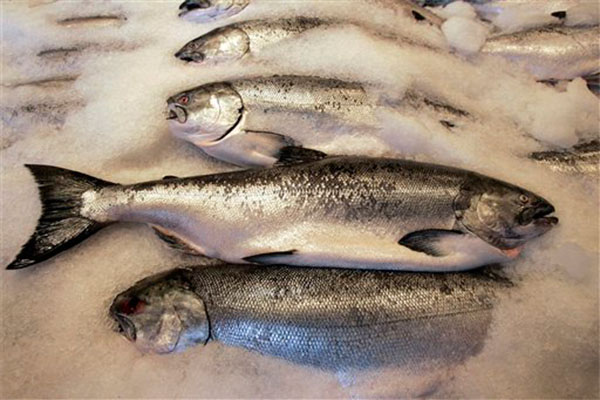On Nov. 19, the Food and Drug Administration approved genetically modified salmon as safe for human consumption. A company called AquaBounty Technologies plans to market the fish, called AquAdvantage, in the U.S. sometime in the next two years. But many people in Brooklyn don’t seem to be in a big hurry to eat it.
The salmon, which critics call the “frankenfish,” is created by adding a Chinook Salmon’s growth gene to an Atlantic Salmon. The gene is constantly “on,” ensuring that the fish does not stop growing, as opposed to wild salmon, which have natural periods of non-growth. This causes the modified salmon to grow to full size much faster than a wild salmon.

After the FDA’s decision, some national companies were quick to let their customers know whether or not they would sell the modified salmon. Whole Foods, known for its love of all things organic and natural, did not surprise customers when the company announced that it would not be selling the fish. Costco has announced it won’t be selling it either.
On a national level, the issue was quickly polarized between those who fear the modified salmon will cause health issues and those who agree with the FDA. The website for change.org has a petition against the salmon that has gathered more than 50,000 signatures. The group is claiming the salmon is 40 percent more likely to cause an allergic reaction when eaten. The FDA on the other hand, says that it “has thoroughly analyzed and evaluated the data and information submitted by AquaBounty Technologies regarding AquAdvantage Salmon and determined that they have met the regulatory requirements for approval, including that food from the fish is safe to eat,” according to Bernadette Dunham—D.V.M., Ph.D., and the director of the FDA’s Center for Veterinary Medicine—in a press release.
What about Brooklyn? The Ink, in a decidely nonscientific survey, asked some members of the fish-selling and fish-eating public. A number of people made it clear that they do not want anything to do with the engineered salmon.

Luis Hernandez, who has been the chef at Café Zona Sur in Park Slope for the last three years, said that he would not be serving genetically modified salmon in the restaurant. “My custom is to offer the best organic food we can,” he said. He added that he believes that eating modified foods is how people can get sick.
Pierless Fish, a seafood distributor in Park Slope, also said that the company would not sell the fish. “We’re not against it, but won’t be selling it here at Pierless,” said Sonja Panacek from administrative marketing, in an email from the company.
Steven Guterman of Brooklyn Heights works at a company called InstantLabs, which helps customers make sure their food is not being mislabeled and on other kinds of food-safety issues. He is also against eating the fish. “We just don’t know enough about it,” he said.
InstantLabs, based in Baltimore, uses microbiology to identify pathogens in the food we eat. The company also tackles food mislabeling and has created a method of identifying DNA from food samples sent in to the company. For example, if a fish is labeled as Atlantic Salmon, but a customer is suspicious that it is not, he or she can send it in to InstantLabs. They company will then test the sample to see if it really is Atlantic Salmon. Guterman added that this method is one that could be applied to distinguishing a modified fish from a regular one, since the FDA is not requiring that companies label the salmon as genetically modified.
Meanwhile, in Bushwick, Ben Silverman has been farming tilapia from a rooftop greenhouse for the last two years. Although he seemed skeptical of the idea of modified fish at first, Silverman said that he would not be opposed to trying the salmon himself. “I don’t have a scientific reason no to try it,” Silverman said, though he added “It feels like you’re cheating the system.”
He added that his farm, Edenworks, would more than likely not look into genetically modifying its own fish, and that it even tries to avoid feeding the tilapia modified foods. The company’s fish receive a vegetarian diet.
One of the other concerns some people have with AquaBounty’s genetically modified salmon is the possibility that the fish might escape and out-compete natural salmon in the wild. But Christopher Sanford, who works in the biology department at Hofstra University in Long Island, said that was unlikely. Sanford said studies have shown that farmed salmon do not do as well as their wild counterparts. “The genes are less fit and do not survive as well in the wild population,” he said. In addition, he said, farmed fish are sterilized in order to prevent them from breeding in the event that they do escape.
He also added that different types of fish do not do well outside of their traditional environment. The temperature difference in the waters could be enough to shock and kill any salmon that get out of their farm sites, according to Sanford.


Leave a Reply